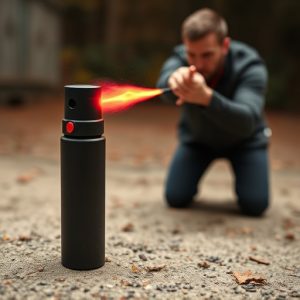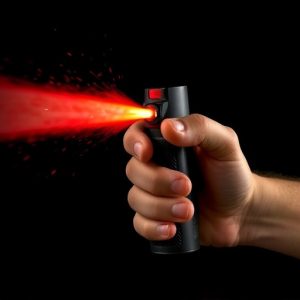How to Treat Pepper Spray Exposure: A Comprehensive Guide
TL;DR: Treating pepper spray exposure involves immediate action including rinsing affected areas wit…….
TL;DR: Treating pepper spray exposure involves immediate action including rinsing affected areas with water for 15+ minutes, removing contaminated clothing, and applying cool compresses. For severe cases, seek medical attention and use over-the-counter pain relievers or anti-inflammatory meds. To prevent future exposure, clean thoroughly, maintain distance from sources, wear protective gear, and learn proper usage/storage of pepper spray.
“Discover how capsaicin, the fiery compound in chili peppers, acts as a potent inflammatory agent when used as a deterrent spray. This article explores effective strategies to navigate pepper spray exposure, from immediate first aid to long-term prevention. Learn vital steps on what to do after coming into contact with pepper spray, including home remedies for soothing and medical care for severe reactions. Find out how to mitigate future incidents of pepper spray exposure with practical tips.”
- Understanding Capsaicin and Its Inflammatory Properties
- Treating Pepper Spray Exposure: Immediate Steps
- Medical Care for Severe Reactions
- Home Remedies and Soothing Measures
- Preventing Future Exposure: Strategies and Tips
Understanding Capsaicin and Its Inflammatory Properties
Capsaicin, the active compound found in chili peppers, is renowned for its intense heat and pungent flavor. Beyond culinary use, it possesses remarkable inflammatory properties that have led to its application in various fields. When exposed to skin or inhaled, capsaicin triggers a cascade of physiological responses, primarily stimulating nerve endings and causing inflammation. This mechanism explains why pepper spray, a common law enforcement tool, relies on capsaicin to disable and subdue individuals temporarily.
Understanding these properties is crucial when considering how to treat pepper spray exposure. Prompt action is essential; washing the affected area with plenty of water and seeking fresh air can help alleviate symptoms. Over-the-counter pain relievers may provide some relief from burning sensations, while specific anti-inflammatory medications can be recommended by healthcare professionals for severe cases. Additionally, staying hydrated and applying cool compresses can aid in soothing the skin and reducing discomfort associated with capsaicin exposure.
Treating Pepper Spray Exposure: Immediate Steps
In the event of pepper spray exposure, knowing how to treat it promptly is crucial. If exposed, take immediate action to mitigate the effects. Start by removing any contaminated clothing or accessories, being careful not to spread the irritant further. Rinse the affected area with plenty of clean water for at least 15 minutes, ensuring every part of the skin is thoroughly washed.
For eye exposure, seek medical attention immediately and flush the eyes with water for at least 10-15 minutes while keeping them open. Avoid using any irritants like soap or alcohol on the skin or eyes. If breathing becomes difficult, move to an area with fresh air and stay calm until symptoms subside. Always keep a close eye on children and pets if anyone is exposed, as they may not communicate their discomfort effectively.
Medical Care for Severe Reactions
In the event of severe pepper spray exposure, immediate medical attention is crucial. If symptoms such as difficulty breathing, excessive coughing, chest pain, or vision impairment occur, seek emergency care. These reactions can be life-threatening and require professional intervention. Hospitals and medical facilities have specialized treatments for managing intense irritation caused by capsaicin, the active ingredient in pepper spray.
How to Treat Pepper Spray Exposure involves staying calm and removing contaminated clothing promptly. Rinse affected areas with copious amounts of water for at least 15 minutes. This helps dilute the capsaicin. Applying a cold compress can alleviate pain and reduce inflammation. If irritation persists or worsens, consult a healthcare professional who may prescribe antihistamines, corticosteroids, or other medications to ease symptoms.
Home Remedies and Soothing Measures
If you’ve been exposed to capsaicin inflammatory agent deterrent spray, it’s crucial to know how to treat the symptoms promptly. While it might seem like a home remedy, seeking immediate relief is essential. Start by removing any contaminated clothing and rinsing the affected area with plenty of water for at least 15 minutes. This step is vital to dilute and wash away the capsaicin oil.
To soothe the skin further, consider using mild, fragrance-free soap and warm water to gently clean the area. Applying a cold compress or ice pack wrapped in a towel can also help reduce pain and inflammation. Additionally, over-the-counter creams containing calamine lotion or aloe vera gel can provide relief from itching and irritation. Remember, these measures offer temporary relief, so if symptoms persist, consulting a healthcare professional is advised for proper medical attention.
Preventing Future Exposure: Strategies and Tips
Preventing future exposure to capsaicin spray is key in mitigating its unpleasant effects. After experiencing an exposure incident, it’s crucial to wash affected areas with plenty of water for at least 15 minutes. This helps flush out any remaining pepper spray particles. Remove contaminated clothing and shoes, and thoroughly clean them with soap and water.
To avoid future incidents, consider implementing several strategies. Always be aware of your surroundings in high-risk areas. Keep a safe distance from known pepper spray sources. Wear protective gear like gloves and eye protection when dealing with potentially harmful substances. Additionally, learn how to properly use and store capsaicin deterrent sprays to ensure they remain effective. Regularly maintain and replace them as needed.
Capsaicin, the active ingredient in pepper spray, can cause significant inflammation and pain. Understanding its properties is key to knowing how to treat pepper spray exposure effectively. By taking immediate steps after exposure, such as flushing the affected area and seeking medical care for severe reactions, you can mitigate the symptoms. Home remedies like using cool compresses and over-the-counter antihistamines provide temporary relief. To prevent future exposure, consider strategic tips like wearing protective gear and choosing pepper spray deterrents with lower capsaicin concentrations. Following these measures can help ensure your safety and ease the discomfort associated with pepper spray exposure.


